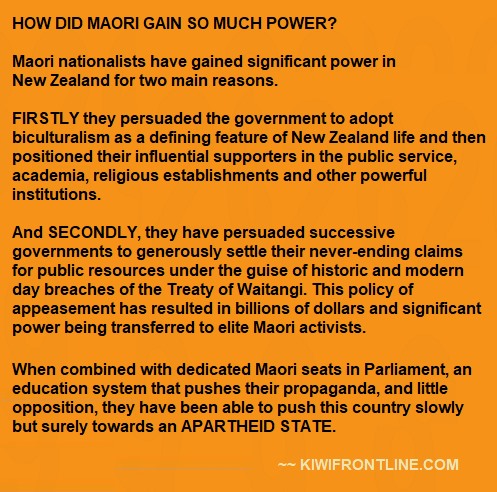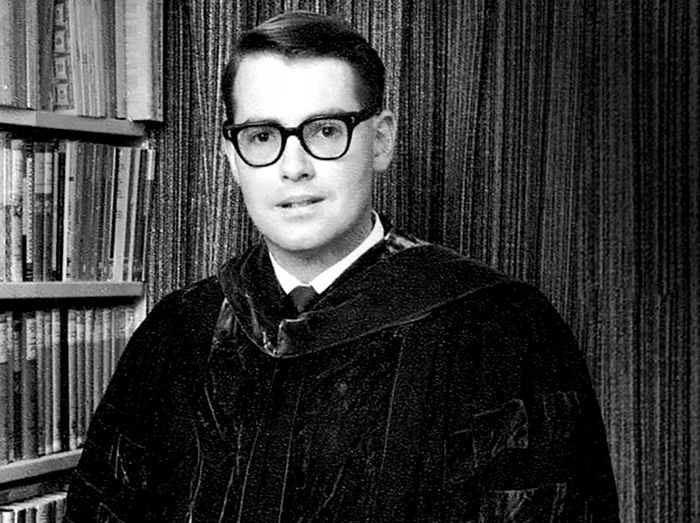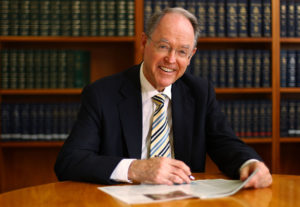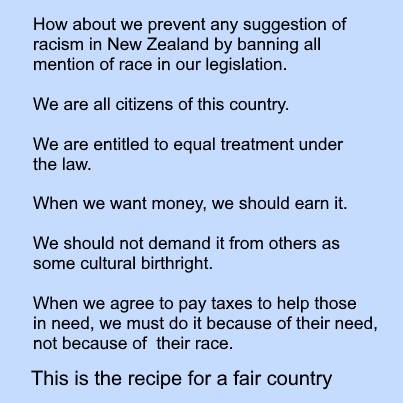
Apartheid in New Zealand



We have this rather extraordinary liberal preoccupation with everything Māori while we push Pakeha culture aside. Māori are having a whale of a ride on the back of the Treaty. What the Treaty doesn’t say they make up, and the liberal intelligentsia are “yes, yes, rah, rah”. The courts chime in from time to time. So you won’t see much movement on monarchy, for example, from Māori, who want to maintain the link with the Crown, or from the wider New Zealand public…..
…..Why should I be? I’m only jumped on by ignoramuses – people who believe in big government and people who think te reo and separatism are the answers to Māori problems. After World War II, we were empowering Māori, but then we slipped into welfare mode, and Māori have been the biggest and most conspicuous of the losers from modern policies. That is what worries me. I didn’t attend integration rallies in the United States in order to come home to find Māori pushing for separatism and separate treatment. What irritates me most of all are the liberals who marched alongside me when we wanted to stop rugby contact with South Africa because of apartheid; those same people now say, ‘Let’s do some separatism, just a little bit”. If we want to ruin this country, that is the way to do it. Not only because it’s wrong, but because it is proven not to help Maori…….
Source →

Decisions should be made by local government elected by all citizens
“Several decades ago . . . we started the nonsense of imagining that the Treaty contained ‘principles’ that nobody has yet been able to find in the document itself.”
IN THE Wanganui Chronicle of May 20, Whanganui MP Chester Borrows made a number of assertions, including about me, which require a reply.
First let me say that I have long admired Mr Borrows. He has a genuine concern for the well-being of all our citizens, especially those who have had a tough upbringing. I was delighted when he became a Member of Parliament in 2005 when I was leader of the National Party.
But in my opinion he is quite wrong on Maori issues. He accuses the “same old culprits — Don Brash, Muriel Newman, Winston Peters, Uncle Tom Cobleigh and all” — of having “not a shred of evidence” for claiming that “the Government is about to sign away to Maori the ownership of water”.
But the consultation document which the Government itself issued makes it abundantly clear that, if the proposals in that document are adopted, iwi will have a significant say in the allocation of water.
What is ownership if not the right to decide what happens to an asset? To date, decisions about the allocation of water have been made by local governments, elected by all citizens regardless of race, and that’s how it should be. The Government’s proposals envisage a radical change in that arrangement, with iwi “able to participate in decisionmaking about fresh water in their rohe”.
The consultation document notes that proposed amendments to the RMA provide for so-called “iwi participation agreements”, which will “require councils to invite iwi to discuss and agree on how iwi may participate in planning” [my emphasis].
The Treaty of Waitangi gave Maori rights over the property they owned in 1840. Some of that property was sold by Maori, some was taken unfairly by the Crown — and for this reason compensation has been paid more than a century later. And that’s appropriate. But at no time have Maori claimed to own water, and even had they made such a claim, the Water and Soil Conservation Act of 1967 made it abundantly clear that water is owned by nobody.
Mr Borrows quotes a comment I made in a 60-second conversation we had as we met very briefly a few weeks ago, and notes that I want to take race relations back 40 years ago. What I was trying to assert was that for most of our history successive governments have taken seriously Governor Hobson’s statement as Maori chiefs signed the Treaty that we are now all one people.
Several decades ago, in the late 80s actually (so 30 years ago), we started the nonsense of imagining that the Treaty contained “principles” that nobody has yet been able to find in the document itself, nor to adequately define. We started to pretend that the Treaty really involved a “partnership” of equals between Maori chiefs and their descendants on the one hand and the Crown on the other.
But the very first clause of the Treaty states that “the chiefs of the Confederation of the United Tribes and the other chiefs who have not joined the confederation, cede to the Queen of England forever the entire sovereignty of their country”. Doesn’t sound like a partnership of equals — or any other kind of partnership — to me!
In defending the proposal to introduce Maori wards in New Plymouth, Mr Borrows asserts that “wards have been part of New Zealand democracy forever”. But those wards were never based on the ethnicity of one’s ancestors except in the case of the Maori electorates in Parliament. And those Maori electorates, established in 1867 for five years, have long outlived their relevance. There are just seven Maori electorates but more than 20 Maori Members of Parliament.
Mr Borrows protests that “no Maori has ever won a general seat campaigning on Maori issues”. But what, pray, are “Maori issues”? For most Maori, I suspect the issues they most care about are the ability to access healthcare when they need it, the quality of the local school, and the ability to afford adequate housing — exactly the same issues which everybody else is concerned about.
Bill English committed a future National Government to scrapping Maori electorates. I agreed with him then and I agree with him now. It’s well past time when we should be treating all New Zealanders as equal before the law, and dealing with need where required, not on the basis of the race of one’s ancestors.
By Dr Don Brash
Wanganui Chronicle 7/616

The New Zealand Herald article 26/4/16
By Dr Don Brash
ACT OF PARLIAMENT MADE WATER OWNERSHIP CLEAR
In the Weekend Herald recently, Lizzie Marvelly used her column to deplore what she called “racist sentiment . . . from a disaffected group of extreme right-wing former politicians” who had been responsible for running advertisements highlighting the Government’s intention to involve iwi in decisions about the allocation of water.
I don’t see myself as “extreme rightwing”, but I am certainly a former politician and, as the spokesman for the campaign to highlight the Government’s intentions with respect to water, it is hard for me to avoid the conclusion that she was referring to me.
Ms Marvelly said some things with which I agree. She listed the ways in which all New Zealanders have an interest in water— rivers, lakes and coastlines.
She made the point that all New Zealanders have a strong interest in ensuring water quality is improved and maintained. Precisely. Then why does she support the Government’s proposal to give a racially selected group of New Zealanders — those who can claim at least one Maori ancestor — a preferential role in planning how water can be used?
SURELY THOSE WHO WANT TO PROVIDE PREFERENTIAL ACCESS TO ANY RESOURCE PURELY ON THE BASIS OF RACE ARE THE REAL RACISTS, NOT THOSE WHO OPPOSE RACIAL PREFERENCE?
Make no mistake: A PREFERENCE BASED ON RACE IS WHAT THE GOVERNMENT PROPOSES. In the consultation document issued a few weeks ago, it states the Government wants to ensure “iwi and hapu are able to participate in decision-making about fresh water in their rohe”.
The document notes the Government proposes to amend the Resource Management Act to provide for new rohebased agreements between iwi and councils for natural resource management. These agreements will be initiated by iwi through notice to the councils, and set out how iwi and councils will work together in plan-making, consenting, appointment of committees, monitoring and enforcement, bylaws and councils’ other statutory responsibilities.
IN OTHER WORDS, THE GOVERNMENT PROPOSES CO-GOVERNANCE BETWEEN LOCAL GOVERNMENT AND IWI ON A VAST SCALE.
Ms Marvelly may see nothing wrong with that, and refers at one point to Maori being the Crown’s “Treaty partner”.
She further claims that Maori interests in water “are supported by the common law custom of Native Title”, the basic tenet of which “is that a change in sovereignty doesn’t automatically mean a change in property ownership. In our local context, it means Maori have rights and interests in land and water until they voluntarily decide to gift, sell or assign them”.
But to suggest that Governor Hobson really saw himself, on behalf of Queen Victoria, entering into a partnership with a large number of chiefs, many of whom could neither read nor write, has to be a total nonsense, Lord Cooke notwithstanding. Yes, a change in sovereignty does not automatically mean a change in property ownership, and Article II of the Treaty made that quite explicit — the property rights of those who signed the Treaty were to be respected.
Land was to be bought from Maori, not merely confiscated, and where confiscation took place in a way seen as unfair nearly 200 years later, today’s taxpayers are paying compensation for that action.
But as several prominent Maori have said in recent times, Maori never regarded themselves as owners of water, and even had they done so, an act of Parliament almost 50 years ago made it clear that nobody owned water.
This month former Maori Council chairman Maanu Paul said any commercial operation should have to pay a fee for using water “because these people are profiting from the use of a common good that belongs to Maori”. Total nonsense.
There may well be merit in local governments charging a fee for the use of water, but if so that fee should belong to the local government levying it, not to a group which claims ownership because some of their ancestors were Maori.
The Treaty of Waitangi conferred on Maori the “rights and privileges of British subjects”, an extraordinarily far-sighted thing to have done in 1840.
But there was absolutely no suggestion in the Treaty that those with one or more Maori ancestors should have superior governance roles over resources, or in local government, 176 years later.
It is also ludicrous to suggest that, when Maori sold land, they somehow imagined that they retained an ownership interest in the water which flowed over it.
ENDS.